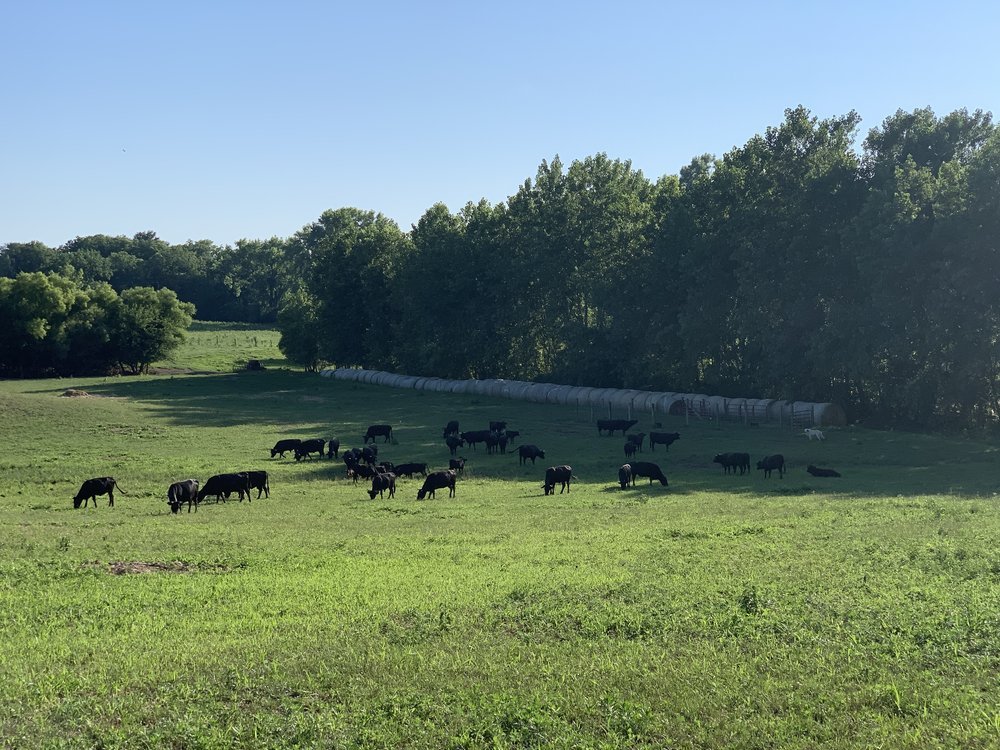7 Things You Need to Know About Regenerative Farm Meat
At Bland Family Farm, we believe in more than just growing food; we believe in regenerative farming. Our journey began with a simple desire for superior, nutrient-dense food for our family. The passion for quality and a commitment to knowing where our food comes from fueled our venture into regenerative agriculture. If you’re interested in learning what regenerative farming is all about and what you should know about regenerative farm meat, this post is for you!
Understanding Regenerative Farming
Before we dig into the content, it’s important to understand what regenerative farming actually is. Regenerative farming is not just a method; it's a holistic approach to agriculture that aims to restore and enhance the health of the land. It goes beyond sustainable practices by actively improving soil health, biodiversity, and ecosystem resilience.
At its core, regenerative farming seeks to work with nature rather than against it, fostering a symbiotic relationship between the farm and the environment. We believe you should serve nature and all is well. No hormones. No antibiotics. No unnatural inputs.
The Bland Family Farm Journey
Our journey into regenerative farming with meat and produce started with a fundamental desire – the pursuit of the highest quality, most nutrient-dense food for our family. As we started to grow and raise our own food, this passion organically evolved into a mission to offer the same exceptional quality to others. We began small, selling our excess produce at local farmer's markets, and our commitment to regenerative practices set us apart.
What You Should Know About Regenerative Farm Meat
Holistic Animal Well-being
Regenerative farms focus on the holistic well-being of the animals they raise. This means providing them with a natural environment to express their instinctive behaviors. Animals on regenerative farms graze in open pastures, practice natural mating, and live in conditions that prioritize their comfort and health. This humane approach not only ensures ethical treatment but also contributes to the superior quality of the meat produced.
Nurturing the Land
Regenerative farming places a strong emphasis on soil health, recognizing it as the foundation of a thriving ecosystem. Healthy soil equals healthy plants, which, in turn, leads to healthy animals. At Bland Family Farm, we employ practices such as cover cropping, crop rotation, and minimal tillage to regenerate the soil. These practices not only improve soil structure and fertility but also contribute to increased water retention and reduced erosion.
Holistic Grazing Practices
In addition to crop-focused regenerative practices, our farm prioritizes holistic grazing for our livestock. Rotational grazing ensures that animals graze in a way that mimics natural herd behavior, promoting healthier pastures and preventing overgrazing. This not only benefits the land but also results in high-quality, nutrient-dense meat that reflects our commitment to superior food.
Regenerating Ecosystems
Biodiversity is a key indicator of a healthy ecosystem, and regenerative farming actively encourages it. We've seen the positive impact on our farm as diverse plant and animal life flourish. From beneficial insects contributing to pest control to birds enhancing pollination, the regenerative approach fosters a balanced and thriving ecosystem.
Nutrient Dense Meat
The most rewarding aspect of our regenerative farming journey is hearing the transformative stories from our customers. Many have shared how our food has positively impacted their health, alleviating issues such as stomach problems and inflammation. This connection between regenerative practices and the well-being of our customers reinforces our commitment to cultivating food that nourishes not only the body but also the land.
Regenerative farm meat stands out for its nutrient density. Animals raised on regenerative farms have access to diverse and natural diets, leading to meat that is rich in vitamins, minerals, and beneficial fats. Regenerative farming practices can contribute to higher levels of omega-3 fatty acids and antioxidants in meat, offering consumers a healthier and more nutritious option.
Ethical Sourcing
Knowing where your food comes from is a fundamental aspect of conscious consumption. Regenerative farmers are often transparent about their practices, allowing consumers to make informed choices. When you choose regenerative farm meat, you support ethical sourcing practices that prioritize the well-being of both animals and the environment. It's a step towards a more sustainable and responsible food system.
Positive Impact on the Community
As we reflect on our regenerative farming journey, we are inspired by the positive impact it has had on our land, our community, and the well-being of those who consume our products. Looking towards the future, we remain committed to continuous improvement, exploring innovative regenerative practices, and contributing to a more sustainable and resilient food system.
Choosing regenerative farm meat is a conscious decision that goes beyond mere sustenance. It's a commitment to ethical animal treatment, environmental sustainability, and your own health. By understanding the principles behind regenerative farming, you empower yourself to make choices that contribute to a more regenerative and resilient food system. So, the next time you're at the butcher's counter or farmers' market, consider opting for regenerative farm meat – a choice that nourishes the land and, in turn, nourishes you.
If you’re in the Central Illinois area and interested in purchasing regenerative farm meat, check out our products.
